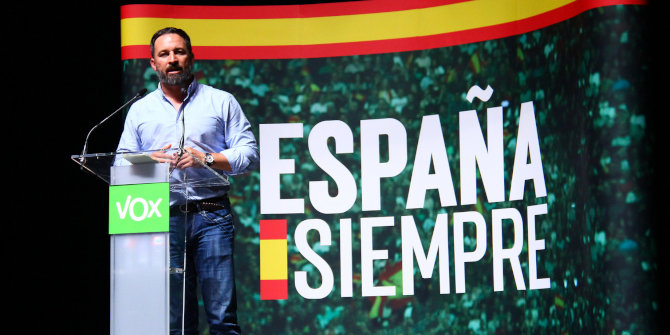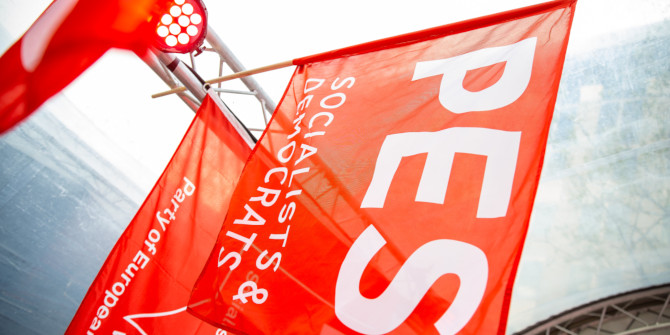 On 24 April, Serbs were called to the polls only two years after the previous parliamentary contest, half-way through the government’s mandate. Reports in the international press focused on the elections being a test for the ruling party’s ‘pro-European’ positions against the advancement of the nationalist far right. Tena Prelec argues that this is only part of the picture, and far from being the most important matter.
On 24 April, Serbs were called to the polls only two years after the previous parliamentary contest, half-way through the government’s mandate. Reports in the international press focused on the elections being a test for the ruling party’s ‘pro-European’ positions against the advancement of the nationalist far right. Tena Prelec argues that this is only part of the picture, and far from being the most important matter.
Last Sunday, another general election was held in Serbia, despite the regular ballot not being due until 2018. This was the 15th time Serbian citizens were asked to vote for their parliament since 1990 – an average of once every 1.6 years. There was no impending external crisis, no reason to doubt in the stability of the ruling party (secured by a landslide victory in 2014), and no grounds to argue that the government had exhausted its mandate by fulfilling all its electoral promises. It was thus clear since the beginning that the vote represented an attempt by Prime Minister Aleksander Vučić to bank on his current popularity in order to cement his hold on power.
The 24 April parliamentary election was called alongside already planned local and regional elections. It is reasonable to believe that this constituted a further reason for Vučić to throw his hat in the ring in the hope that his name on the lists will help the local branches of the party to gain better results. The PM’s leadership is as top-down in his party as it is in the government he leads, and indeed his popularity surpasses by far anyone else’s in the party ranks.
This attempt, however, almost backfired. As the final results finally came in, after a long and heavily criticised delay by the central electoral committee, it became clear that the forecasts tipping Vučić’s Serbian Progressive Party (SNS) at over 50 per cent of the vote were not justified. The final count has now settled at 48.2 per cent, a figure inferior to the 49.3 per cent achieved by the ruling party in 2014. The SNS will thus end up losing 27 seats in parliament, in spite of having this time joined forces with several minor parties. On paper, the SNS leadership is jubilant; behind the scenes, the real reaction may well be one of bitter disappointment.
Table: Result of the 2016 Serbian parliamentary election and change in seats from 2014

Note: Vote shares are rounded to one decimal place. There are 250 seats in the Serbian Parliament. The change in seats refers to the change since the previous election in 2014. For more information on the parties, see: Serbian Progressive Party (SNS); Socialist Party of Serbia (SPS); Serbian Radical Party (SRS); Democratic Party (DS); Enough is Enough (DJB); DSS – Dveri. Source: Wikipedia, 25 April 2016. Table compiled by Bogdan Marković and EUROPP editors.
Of the other parties, the Socialists (SPS) led by the Minister of Foreign Affairs and former PM Ivica Dačić incurred heavy losses, while the feared hemorrhaging of votes was limited in the case of the Democratic Party (DS). Three formations that were previously absent have secured seats: the nationalist far right with the Serbian Radical Party (22 seats) and DSS – Dveri (13 seats), and finally the progressive movement Enough is Enough (16 seats).
It is therefore striking that prior to the vote, opposition to Vučić’s SNS in the parliament was almost non-existent, considering that the SPS are de facto SNS allies, and that the only opposition that was present in parliament – consisting of the DS and its spin-off SDS – was heavily discredited. A much more composite picture is emerging after the April 2016 ballot: on the one hand, the nationalist far right is back on the sanctioned political scene; on the other, progressive political forces calling for the strengthening of democratic institutions, and for an alternative European path to the one set out by the government, are now emboldened. Vučić is no longer the only bastion of ‘Europeanness’ in Serbia (though the western press is yet to grasp that).
So who is the real winner?
There is no denying that the SNS is still the overwhelming force on Serbia’s political scene. A preference higher than 40 per cent is something most western ruling formations can only dream of. Vučić’s appeal is certainly still strong among the Serbian population, where the model of a ‘strong leader’ enjoys widespread adherence.
Serbia’s PM, who was Minister of Information under war-time leader Slobodan Milošević and made his first political steps in Vojislav Seselj’s ultra-nationalist Serbian Radical Party, has been particularly successful in using his nationalist credentials to reassure the hard-line conservative fringes among the public that Serbia’s national interests will be well protected. At the same time, he has pandered to the West and convinced European leaders that if Serbia was to be set on the right course for European integration, he was the man for the job. They placed their trust in him – and still do, as evidenced by the congratulations which promptly came in from Johannes Hahn, Sebastian Kurz and others.
However, considering the significant disadvantages that exist in terms of media coverage and party funding, the success of some minor parties is truly remarkable. One to watch out for is ‘Enough is Enough’ (DJB), led by engineer Saša Radulović. In his short spell as Minister of the Economy under Vučić (September 2013 – January 2014), Radulović endeavoured to clean Serbia’s finances by starting with public companies. Openly attacked by Vučić after deciding to stop several privatisation processes which were deemed to be dubious, Radulović resigned and launched his own political movement. The new formation failed to pass the threshold in 2014, but more than tripled its support in the 2016 contest.
This may well mean enhanced visibility for DJB and an opportunity to truly start profiling themselves as a serious political alternative for those voters who are yearning for more transparency and pluralism, but were previously disappointed by other political actors such as Boris Tadić (former Serbian President and DS leader, now part of the Coalition for a Better Serbia). It will indeed be interesting to see whether DJB, the DS and the Coalition for a Better Serbia will find common ground to challenge the government, or if they will remain isolated voices. In the first scenario, the progressives would stand much better equipped to make a meaningful impact at the next round of elections.
On the other side of the spectrum, the comeback of Šešelj’s SRS only weeks after his first-grade acquittal by the International Criminal Tribunal for the Former Yugoslavia, as well as the seats secured by DSS-Dveri, indicate that Serbian nationalism and pro-Russian stances are still an important factor in the country. To a certain extent, this type of opposition plays into Vučić’s favour, as the PM can claim that he represents the only viable pro-European alternative for Serbia. In so far as this means putting a respectable face to a latent nationalist tendency and attaching to it a pro-EU tag, he is probably right. The political game played by the PM so far has been a very clever one and not without merits.
This pro-European versus pro-Russian divide, often implied by the international mainstream media when reporting that Vučić’s victory was an ‘endorsement of EU policies‘, is, however, wide of the mark. For a start, even though Vučić pays ample lip service to European integration, his past allegiances and present style of government do not quite match these stated intentions. The worrying state of independent media in Serbia (recently described by the OSCE as being ‘virtually non-existent’) and the PM’s undoubtedly autocratic way of understanding public office stand as a reminder of a governing style that should not be understood as conforming to European values – but that, alas, is becoming increasingly common throughout the continent.
Furthermore, Vučić has been markedly omnivore in choosing his allies. While keeping western leaders happy with a more lenient approach towards Kosovo, he has never reneged the traditional partnership with Russia, nor has he backed out of securing new ties with the UAE, with China and with other foreign investors. Ultimately, this is not something he has ever attempted to hide, repeating on more than one occasion that economic interest is the number one criterion in his government’s line. This ‘Europe versus Russia’ narrative is therefore distinctly unhelpful when trying to understand the political dynamics in Serbia and the wider region – lest it ends up overshadowing more crucial issues.
Please read our comments policy before commenting.
Note: This article gives the views of the author, and not the position of EUROPP – European Politics and Policy, nor of the London School of Economics. Featured image: hungarytoday.hu.
Shortened URL for this post: http://bit.ly/1SGQOeQ
_________________________________
 Tena Prelec – LSE / University of Sussex
Tena Prelec – LSE / University of Sussex
Tena Prelec is an Editor of EUROPP. She is a doctoral researcher at the University of Sussex and keeps an active involvement in the LSE’s research unit on South Eastern Europe, LSEE.





